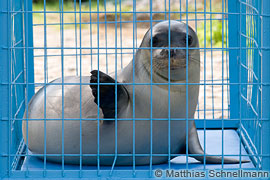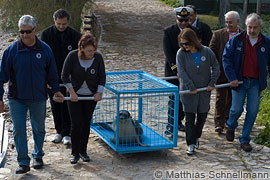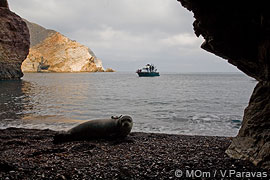

 |
||
 |
||
Vol. 11 (1): June 2008 |
||
Orphan Returns to ‘Mother’ SeaViktoria is released into the protected waters of the Sporades Marine Park
|
 |
|
|
|
|
 |
|
|
|
Viktoria was rescued last October by her namesake, Viktoria Drouga, a taverna owner on the Cycladic island of Tinos, who saved the pup from battering storm waves by jumping into the sea herself [Newborn pup in dramatic rescue, TMG 10 (2): November 2007]. Weak and exhausted from her ordeal, pup Viktoria was then just 4 days old and weighed only 15 kg. Transferred to the Seal Rehabilitation Centre on Alonnisos, she responded well to the 4 month treatment regime, and weighed in during a final veterinary check at 52 kg.
Initially, food and nourishment relied on oral rehydration therapy – a live-saving mixture of water and salts – then highly nutritious fish porridge, delivered by stomach tube. Then it was on to skinned filleted fish, then gutted whole fish, and finally – to help hone her diving and hunting skills, live fish introduced to her rehabilitation unit pool.
Some 300 well-wishers attended the release event, including local inhabitants of Alonnisos; Viktoria Drouga who rescued the ailing pup from stormy seas back in October 2007; Sofia Staikou, President of Piraeus Bank Group Cultural Foundation and Head of Corporate Social Responsibility, which has supported the rescue and rehabilitation financially through its CSR programme; the Mayor of Alonnisos; marine park officials, and a visiting representative of the Government of the Balearic Islands, Spain.
“I’m so proud,” said Viktoria Drouga after a brief final visit to the pup before its release. “It was just a feeling, but even from the beginning I was convinced she would survive.”
For Piraeus Bank, it was also something of a symbolic moment.
“It is more than 15 years now that we have been supporting efforts to conserve the monk seal, the most endangered marine mammal and symbol of the biodiversity of Greece,” said Sofia Staikou. “We earnestly hope that we can set an example for others to follow. Protecting the natural environment is not only a concern for all of us, it is an obligation.”
Seal rescuer calls for actionThe Director of a small tourist enterprise on Tinos island, who earlier this month dived off a pier in gale-force winds to save a newborn seal from drowning, yesterday appealed for a concerted campaign to preserve the Mediterranean monk seal, one of the world’s most endangered mammals. “Authorities should emphasize the importance of protecting the monk seal,” Victoria Drouga said. Of some 500 monk seals left in the world, around half live off Greek shores but they are endangered by overfishing and pollution. “If we all become sensitized to this issue, maybe some good can be done,” said Drouga, who on October 1 leaped off a pier at Kolybithra in northern Tinos and rescued a seal pup that had been floundering in the choppy waters. “The sea was so rough that I had problems getting to the seal which was being tossed about by the waves,” Drouga said, noting that winds had reached 9 Beaufort. […]
|
 |
|
|
|
|
 |
|
|
|
Now a hefty 52-kilos, Viktoria was placed in her blue transport cage, then carried towards the village dock, eager onlookers watching from the sidelines.
Looking calm yet puzzled by all the attention, she was placed onboard the launch that would carry her to a secluded bay within the Marine Park, the release monitored only by her principal carers and researchers in order to minimise stress and aid acclimatisation.
Approaching the release site at the island of Yura, the team sighted another young seal swimming off shore. It quickly disappeared. Viktoria was then ferried to the chosen release site by inflatable, an open cave with pebble beach. “She left her cage almost immediately,” Jeny Androukaki later reported, “and quickly began exploring her surroundings, the beach and shoreline waters, playing with the waves and the rocks underwater.”
Prior to her release, Viktoria was fitted with a compact GPS/GSM transmitter pack courtesy of the St. Andrews-based Sea Mammal Research Unit. Unlike satellite tags used in the past, this system is designed to communicate location, depth of dives and other data to researchers via the mobile phone network. However, the device – which can only operate within narrow parameters, in which network coverage, animal behaviour and battery-saving presets all play a part – has so far failed to respond. Though failures in such instruments are far from unheard of, MOm still holds out some hope that Viktoria will make that first call.
“Up till now, unfortunately, Victoria has not sent any message,” says Jeny Androukaki. “At remote islands and, of course, in caves, there is not always a cell phone signal. Although the transmitter does not operate continuously, the integrated computer stores all data on Viktoria’s life, such as times spent on land, or in swimming, diving depths, and movements. Once the transmitter is on in an area receiving a cell phone signal, it will send all data collected so far.”
Assuming it is not broken, that information could still arrive at any time up until the animal’s first moult in September, when the end-of-life transmitter is designed to be shed naturally.
Newborn pup in dramatic rescue, TMG 10 (2): November 2007.
Piraeus Bank supports ‘Viktoria’s’ rehabilitation, Press Release, TMG News archive, 17 December 2007.
TVMallorca, L’aguait. 2007. http://www.youtube.com/watch?v=8AZ_fr5R06Q
Copyright © 2008 William M. Johnson, The Monachus Guardian. All Rights Reserved |